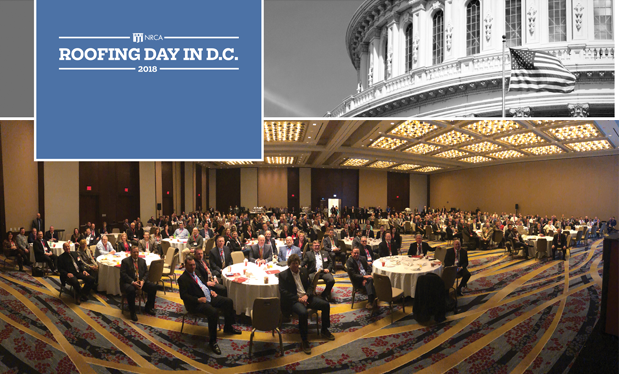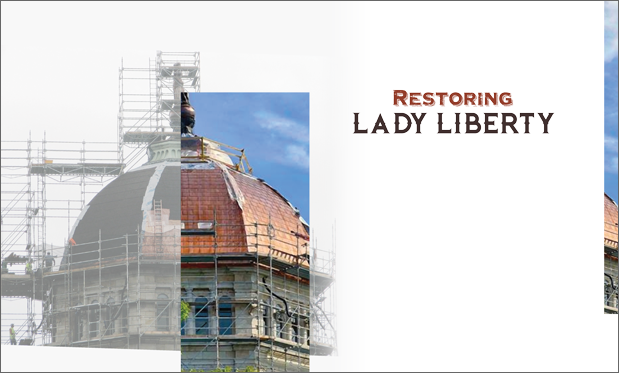As roofing industry employers continue to face workforce shortages in a strong U.S. economy with low unemployment rates, NRCA continues pursuing legislative solutions to help address the issue. However, an unfavorable political environment and growing dysfunction within Congress make attaining legislative objectives increasingly difficult.
An expensive problem
NRCA members consistently report they could take on 10 to 20 percent more work if they could find the necessary workers to keep up with demand. This translates to between $3.6 billion and $7.2 billion in lost economic activity annually. Clearly, the struggle to find qualified workers to fill job openings has become the most difficult limitation on roofing contractors' ability to grow their businesses.
NRCA has worked for many years on legislative initiatives to address the workforce shortage crisis, including legislation to expand career and technical educational programs to better meet the needs of employers and immigration reform legislation to provide a sufficient level of legal immigration to meet industry labor needs. Efforts to pass such legislation have stalled as Congress struggles to find bipartisan consensus in an increasingly polarized political environment.
H-2B program
As efforts to pass legislation that creates a long-term solution to the workforce shortage stall, NRCA continues pursuing short-term solutions to assist industry employers. NRCA has long supported the H-2B nonimmigrant seasonal guest worker program, which permits foreign workers to temporarily enter the U.S. and fill seasonal positions when U.S. workers are unavailable. In this way, the H-2B program enables businesses to operate at greater capacity during peak season.
Many NRCA members participate in the H-2B program even though the process to apply for temporary workers is complicated and costly. The program requires employers to first extensively recruit U.S. workers, gain approval from government agencies and offer workers a premium wage before employers can obtain foreign workers through the H-2B program. But given the failure of Congress to address workforce issues in other ways, the H-2B program is the only option available to employers that want to legally hire foreign workers to fill seasonal positions.
Unfortunately, the program's annual cap of 66,000 visas (33,000 for each half of a fiscal year) has proved to be woefully inadequate to meet the demands of a growing economy. In recent years, the program has been hugely oversubscribed by employers in all types of industries that are desperate to find seasonal workers. For fiscal year 2018, requests for visas were filled under the statutory allocation on Feb. 27, leaving many businesses unable to obtain workers through the program unless additional visas are granted.
Recognizing the growing demand for H-2B workers, in 2015 NRCA and a coalition of business associations successfully urged Congress to approve an amendment in annual appropriations legislation that effectively increases the visa cap annually. This "returning worker exemption," which exempted H-2B workers who returned to the same employers in a given year from the statutory visa cap, was approved with bipartisan support on a fairly routine basis for several years, most recently for the 2016 fiscal year.
In 2017, Congress failed to approve an amendment to provide additional H-2B visas primarily because of growing opposition from groups seeking to restrict immigration. As an alternative, Congress gave the Trump administration the discretionary authority to increase the number of H-2B visas above the statutory cap in accordance with demand. However, the Trump administration provided only 15,000 H-2B visas during fiscal year 2017 and imposed new requirements that made it more difficult for employers to qualify for the additional visas. Many employers that applied for foreign workers for fiscal year 2017 did not receive permission to hire them.
Entering 2018, NRCA and allied groups again worked hard in support of an amendment in the recently passed Fiscal Year 2018 Consolidated Appropriations Act to provide additional H-2B visas for fiscal year 2018.
Despite NRCA's extensive lobbying efforts, Congress again failed to develop the bipartisan consensus needed to include the amendment in the spending legislation. As in 2017, Congress only gave the Trump administration the authority to provide additional H-2B visas in accordance with demand. Specifically, the amendment allows the secretary of homeland security, in consultation with the secretary of labor, to provide up to 69,320 additional H-2B visas beyond the statutory cap for fiscal year 2018. The Fiscal Year 2018 Consolidated Appropriations Act was signed into law by President Trump March 23.
It now is up to the Trump administration to determine whether additional H-2B visas will be granted for fiscal year 2018. NRCA sent a letter to Secretary of Homeland Security Kirstjen Nielsen and Secretary of Labor Alexander Acosta urging them to grant the maximum allowable number of additional H-2B visas. The decision will be a key indicator of the Trump administration's commitment to addressing the workforce needs of employers in roofing and other industries.
Looking ahead
Given the H-2B program is critical to many roofing contractors and currently the only option available to address the workforce shortage, NRCA will continue working in support of the program. NRCA hopes the Trump administration will take prompt action to provide additional H-2B visas for fiscal year 2018, and NRCA will continue recruiting Congressional support for legislation intended to create long-term solutions for the workforce shortage.
Duane L. Musser is NRCA's vice president of government relations.
This column is part of Rules + Regs. Click here to read additional stories from this section.



